If you are a writer or artist, it is easy to feel as though you have missed the boat. As if, today, it is harder to develop an audience than it was 5 or 10 or 20 years ago. You look around at industry trends, at the marketplace, at social media, and feel jaded. You see nothing but noise, and no place for your small voice to be heard.
Today I want to share a story to give you hope that your unique creative vision does matter. That it is important for you to keep going, to keep creating. That the world desperately needs your voice and your art.
The Theater
I have lost some sleep over this in the past year. You see, I live in a small town. It’s about 4 square miles and has this adorable downtown. One of the centerpieces is this movie theater, which was built around 1925:
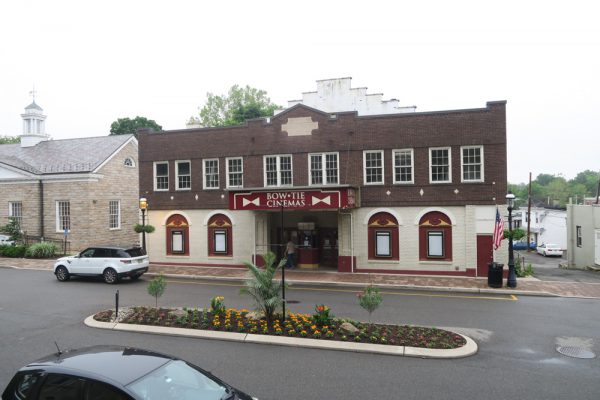
In all the years I have lived here, it was a common site to see families pour out of the theater talking about what they have seen. But soon, this building will likely be torn down and replaced with a couple small retail stores and a bunch of condos.
This will happen (this is a composite image I made in Photoshop, it is not anything that has happened yet):
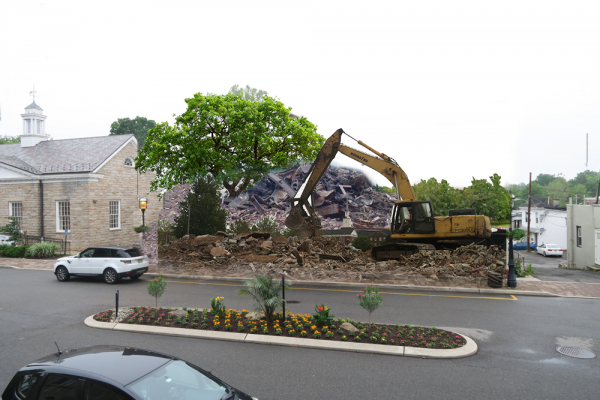
And then something similar to the building below will likely be built there. This image of the first version of what has been proposed by the current owner of the property, but it is not final or approved::
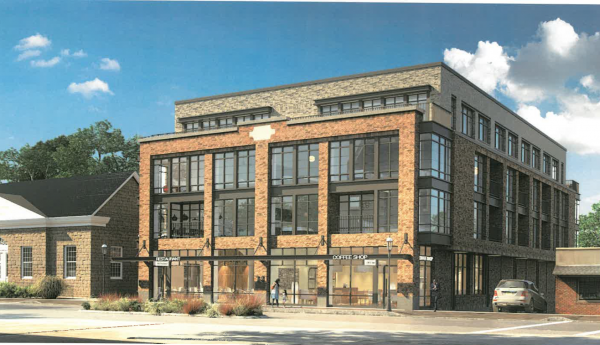
The short version of the backstory is that the former owner of the building put it up for sale. For about a year and a half, it was on the market without a buyer. A local real estate and development company bought it. Soon after, the tenant of the building – the actual movie operator – chose to not renew their lease and leave. The building sat empty with no new theater operator willing to take the space.
I would like to explore how this came to be. I have spent months and months researching this topic and talking with people locally about it. I can’t lie, I’m at an impasse. Not with them, but with myself.
You see, in my heart, I would like for this theater to be saved. For the building to be saved. For our community to continue to have a place that brings us together. That celebrates the arts. That preserves the rich history of this town.
But that likely won’t happen. Today want to dig into why that is and how it can relate to your own personal experience of trying to create and share your art in a world that doesn’t always seem accepting of it.
Why the Theater Feels Special
I’m sentimental when it comes to historic things and to the arts. But when I consider the concept of saving this theater, the truth is, it isn’t simply because I want an old thing saved. I’m not one who feels “everything should remain the same.”
But, in our town, this is a rare community space. A place where strangers, friends, and family do something together. It is a place for shared experience that anyone can join in on. When you experience a movie or performance, it is a communal experience. I’m not sure about you, but I laugh harder a comedy when in a crowded room than when watching it alone.
Living in New Jersey, there are a wide range of activities at my disposal. Yet, I think that the theater experience is different from many other activities such as the arcade at Funplex, or the rollerskating rink or even going to the YMCA. Those activities are about individual experiences that happen to be next to other people.
The theater celebrates a communal experience of the arts.
When the building comes down, I am most sad because something that brought us together is now gone. It’s one less way for our community to truly have a shared experience, and less like a series of people doing individual things next to each other.
Efforts to Save the Theater
When I first heard that the movie operator was leaving the space, I did two things. The first was I immediately called the theater and asked if I could come down right now and take photos of the interior. Surprisingly, they said yes, and for an hour or two, I crawled into every cavity of the space to record it for posterity. I took more than 200 photos. Here is the ticket booth:
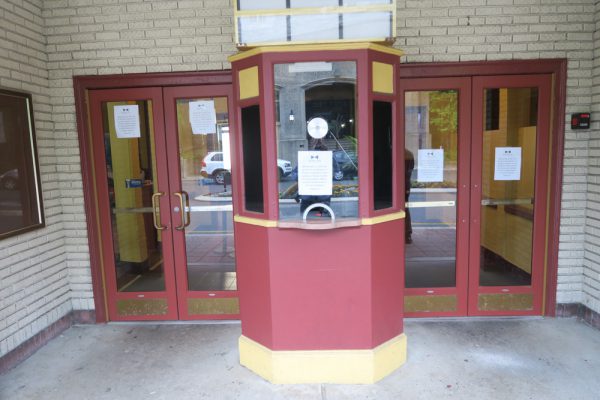
The lobby:
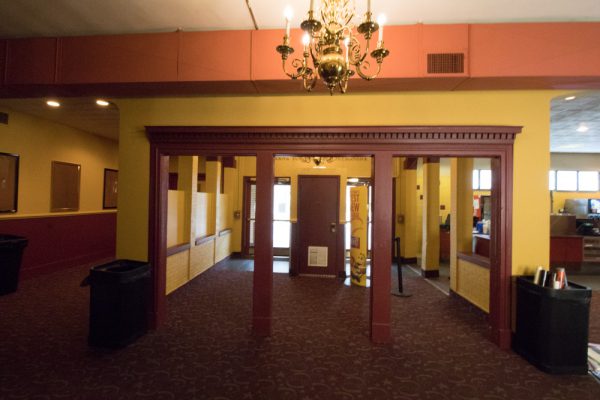
Someone saved some of the plasterwork from the original theater. The rest is hidden behind drop ceilings:
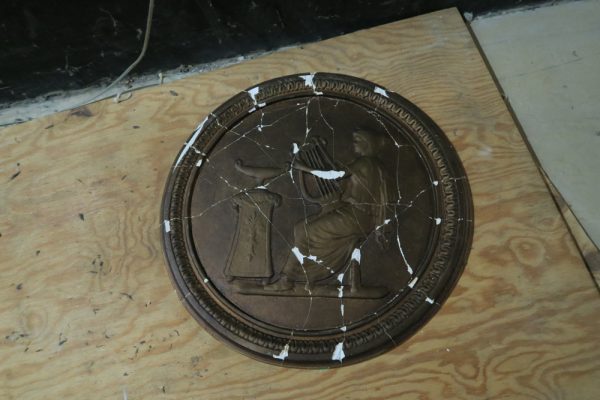
One of the four theaters in this building:
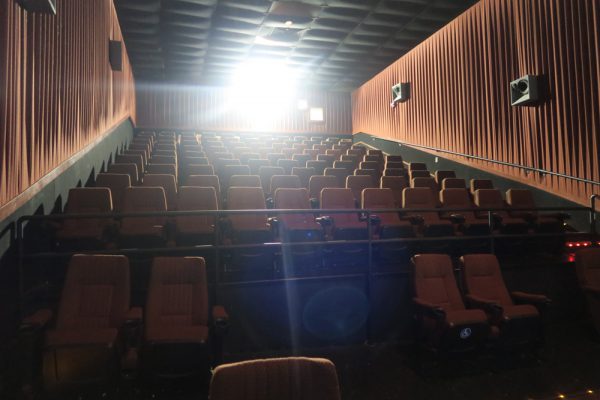
On the floor, you can see the outline of where the movie projector used to sit:
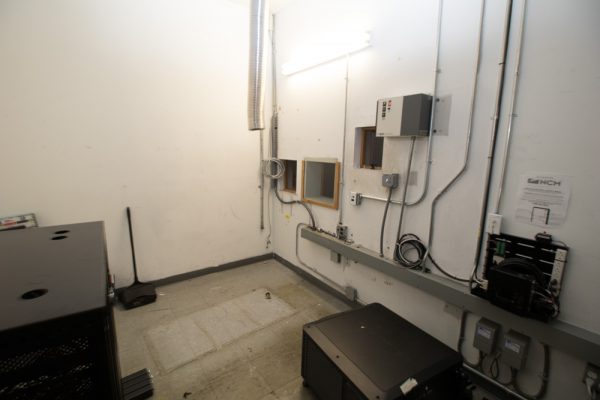
I just realized, this is the last photo that a member of the public will ever take in this theater:
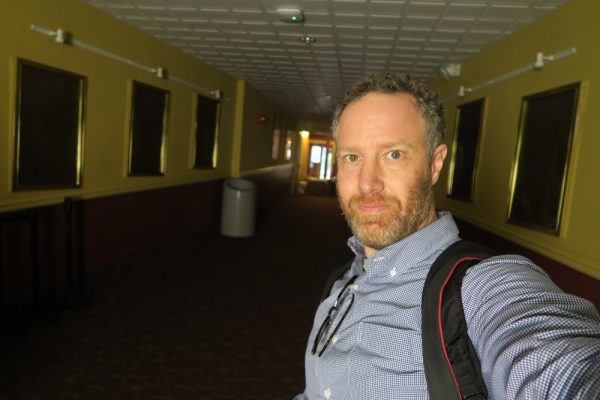
While the theater was cut up from a single large theater to four smaller theaters years ago, there are many architectural elements still present, such as this marble:
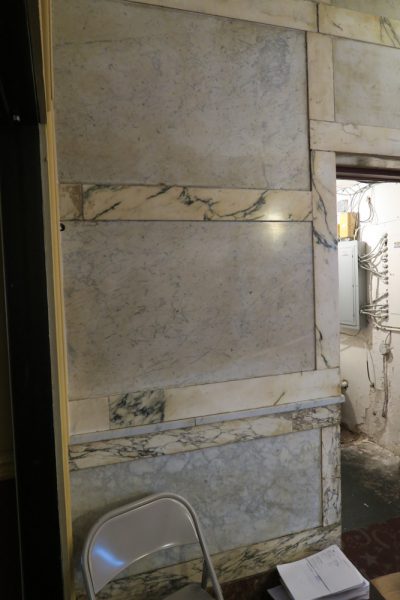
There is a long hallway of office space that looks as though it has been unused for decades:
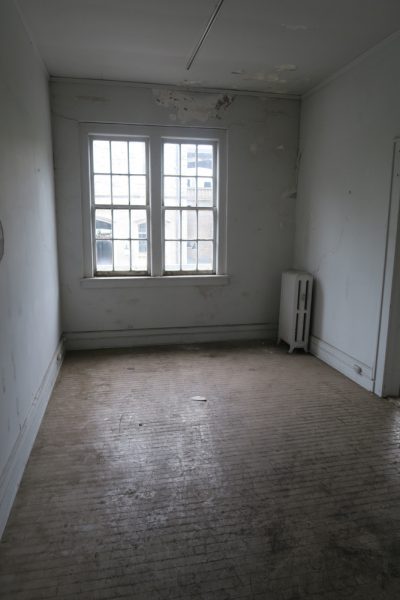
No children will ever use these booster seats in this theater again:
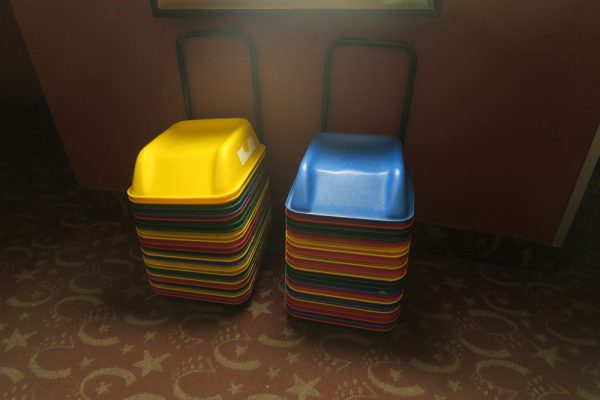
Another view of one of the theaters:
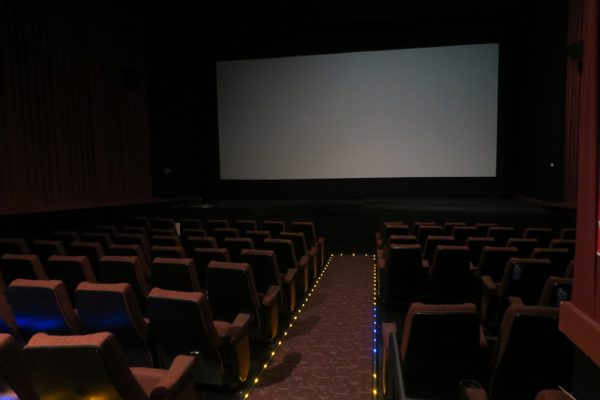
Movies that will not be shown here:
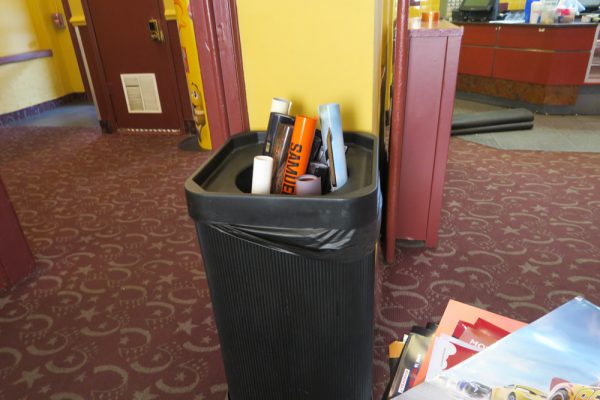
The second thing I did was I began asking questions to people who I know are involved with town affairs. I had a private meeting with the Mayor, with other town officials, with those who run local businesses, and those who volunteer for town events. I talked to a lot of local citizens simply asking for their take on the fate of the theater. My goal in this process was simple: listen.
I began showing up to meetings: town council meetings, planning board meetings, and zoning board meetings, historic preservation meetings. Here too, my goal was to simply listen.
What I heard again and again was this: a great effort was made by many people to save this building and save this theater. I heard story after story of someone who tried to get the money to buy the building, but came up just short. Or of how someone called movie operator after movie operator, trying to get them to take the lease, but no one wanted it. Or from someone who spoke to prominent local residents who have a history of purchasing buildings or funding the arts, but they weren’t interested.
This took place over the course of months. Our town had a special meeting to discuss this building. In the video of the 2+ hour meeting, skip ahead to the time code of 1 hour and 53 minutes. Here a local resident tells you about the efforts he made to purchase the property, and the challenges he had in that process. This is just one of many stories I have heard.
But these stories weren’t public. These were all private conversations and efforts. It made me appreciate how many people care for this community and how difficult it is to solve this situation.
This is not the first time the theater was closed. Back in the mid-1980s the theater was featured on the cover of this newspaper with the headline “The End”:
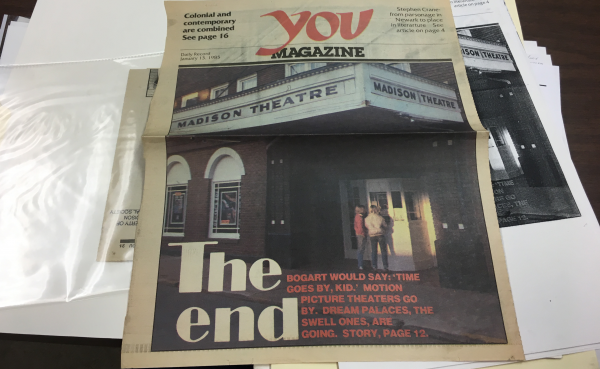
The building was put up for auction and failed to find a buyer at first. Here is a scene from the auction:
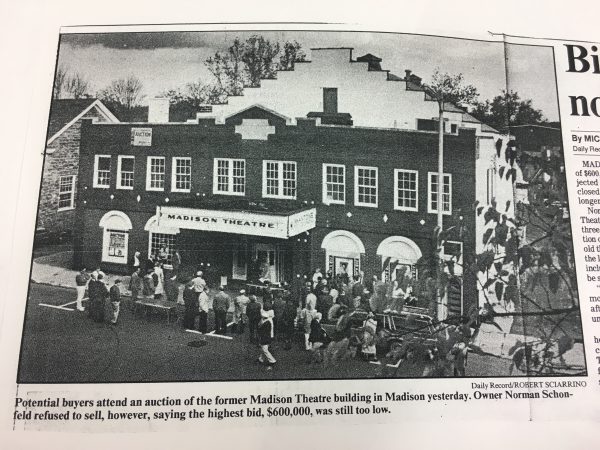
It eventually found a buyer, and after sitting empty for 2 years, was set to reopen. (Note the cardboard cutout of the Three Amigos!)
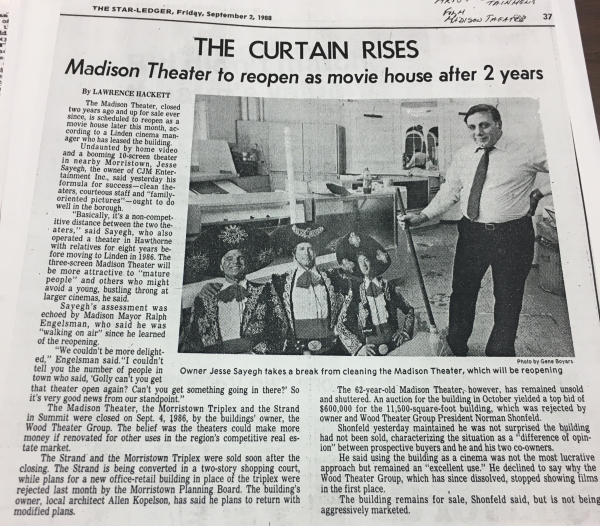
The arts often seem to have this type of relationship with commerce, a tentative one.
Questions I Have Wrestled With
In my months of research, I have tried to consider every aspect of the situation. The theater seems to sit right between two competing needs: a property that is quaint (historic & communal), but also highly valuable private property. Some thoughts on each:
#1 Private vs Public Property: As much as the theater has been a communal space for nearly a century, it is also private property.
Madison is, and always has been a very valuable town to live in. What that means is that people who live hear expect their property value to increase. This is a town with a midtown direct train station to New York City in north central New Jersey.
Every square inch of town has an intrinsic value that someone wants to maximize. I’ve seen small houses sell for $800,000, which are then torn down so that a developer can build a bigger house.
All of this made me consider the burden it puts on property owners if their building can only be used for a single purpose. In this case, if that spot can only ever be used as a movie theater. Understanding that this is private property is an important part of this discussion.
I remember the comedian who went on stage holding the axe, and said, “This is the actual axe that George Washington used to chop down the cherry tree. But, over time, the handle got a little worn, so I replaced it. Then a couple years later, the blade got dull, so I replaced that too. But it is the exact same axe.” As I consider what a “historic downtown” really means, I am confronted with the axe story. Is the downtown that existed in 1930 — every brick supposed to remain unchanged? If so, what burden does this put on the owners of these properties? How does that affect the economic growth of town?
#2 The Distinction Between History and Community
This building is in the historic district, but I suppose I’m not entirely sure what that means. (Here is the form designating it as part of National Register of Historic Places.) Here is the map, indicating that the theater is in the historic district:
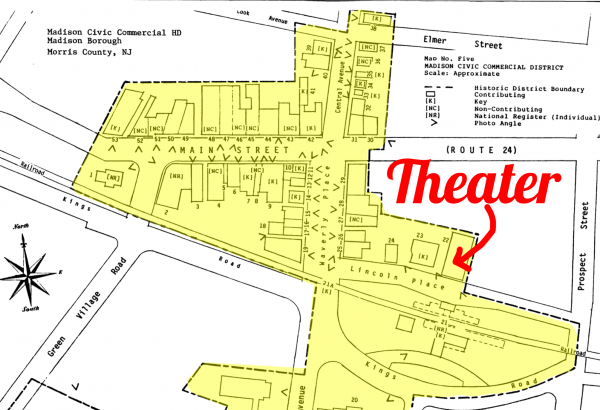
This is what I would call a “quaint” town. Our local government does a wonderful job of ensuring that the town remains that way. Recently, I saw a row of lovely new street lights added a block away from the theater that look like vintage gas lamps. During the recession, I remember pavers being added to the street that the theater sits on, and a cute little garden island added right in front of it. During the summer, what seems to be hundreds of live plants are hung from lampposts all over town, and I watch municipal workers water them all summer long.
The town is filled with adorableness: a clock in the center of town, a grand town hall, and we have traditions such as a holiday parade, farmers market and street fairs.
The theater adds to that quaint town feel. Losing it feels as though we may be losing a centerpiece that draws many to this town.
What I Can Do
In this room at the town meeting is a wide range of viewpoints. I’ve tried to consider them all, because each person loves this community:
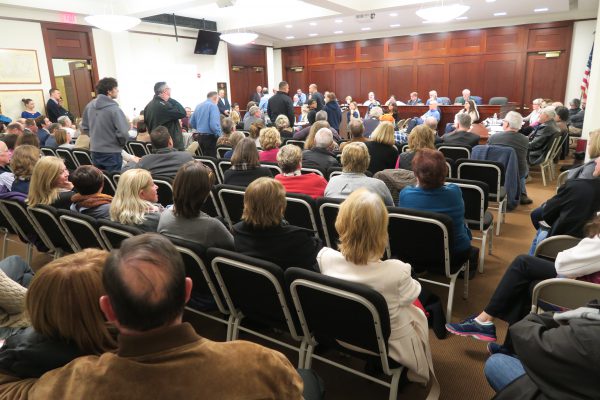
I spent a long time researching this topic, and truth be told, I still feel like there are many other people I should speak to. I felt sad the entire time I wrote this piece, because I don’t like the idea of sitting on the sidelines as the wrecking ball destroys this theater. But the truth is, my research has made me more aware of how complex this situation is.
I don’t want this theater to be destroyed, but I respect the complexity of the situation. There is no simple answer.
The lesson I’m trying to take is to focus my days on supporting the people who I engage with every day. Of finding ways to encourage the arts in my community. In supporting those who do that hard work day in and day out.
The work to preserve the arts in my community is stuff that should be done years before it is ever “threatened.” It is in the hard work of individuals and organizations I see all around me. Local organizations that include:
The Writers Theatre of New Jersey
Shakespeare Theatre of New Jersey
Madison Arts & Culture Alliance
Short Stories Bookshop & Community Hub
Creative Hands Art Studio & Atelier
The Museum of Early Trades and Crafts
Madison Storytellers Festival (I help run this!)
… and so many other wonderful organizations and businesses! What I can do is support these people and organizations.
It is worth noting: there is also something special happening in town. A new community theater space is being constructed. This was shared recently by the Writers Theatre of New Jersey:
“We’re really excited to share these photos of progress in Madison’s new Rose Hall, which will be our new home! We’ll be sharing the space with some other wonderful arts and community groups and we’re looking forward to seeing all of the energy and creativity they bring to the space too!”
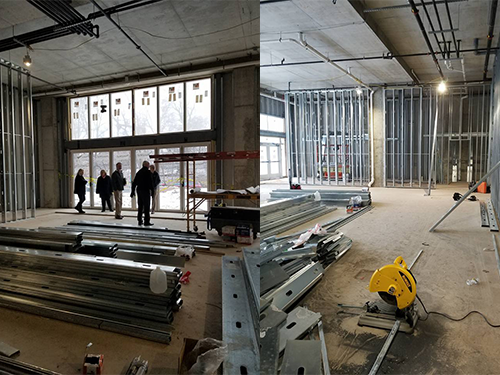
Yes, a theater is being created. One that has the involvement of many arts organizations, as well as town officials and other supporters. Thank you all for that.
My Advice for Sharing Your Writing & Art With the World
So why am I sharing this story with you, a writer or artist who probably doesn’t live in my town or anywhere near it? It is this…
It can be easy to feel that the world has changed, and that the marketplace is now overcrowded; that there is no room for your art to find a place.
But as much as I have lost sleep and felt sad about the theater, I have also forged new friendships along the way. This has helped me better understand my community, and find more connections within it.
You have that same power for your work.
You don’t need to focus on getting followers on social media, you can instead forge true connections with people who love the kind of work you create. Focus your attention on those who care about the same things you do, not on “fighting industry trends” that will take you away from your art.
If I could encourage you to take two actions this week, it would be this:
- Make more time to create, less time to consume or react. Set your own intentions for the week instead of being swayed by the news of the moment, the latest trend, or the 1,000th “best practice” you are told you have to do.
- Make more time to connect with one person this week. Really connect with them. Email an author whose book you loved. Ask a reader a question. Do something to initiate a new connection. That action is often much simpler than we imagine. A smile. An email. A question.
Thank you.
-Dan
